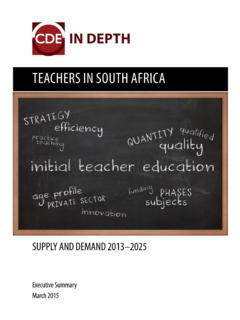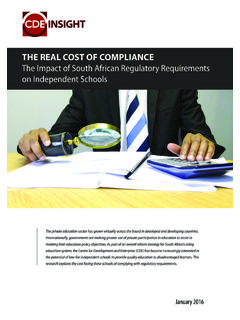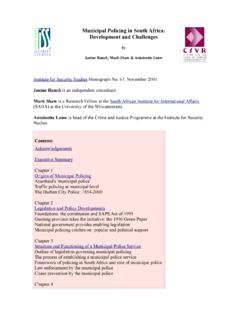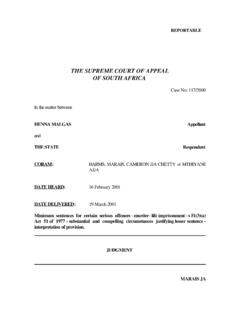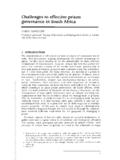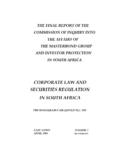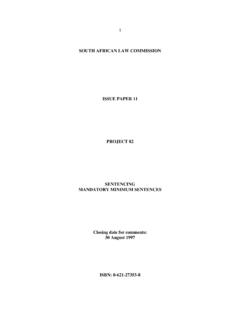Transcription of DEMOCRACY WORKS | CONFERENCE PAPER South …
1 | 1 DEMOCRACY WORKS DEMOCRACY WORKS | CONFERENCE PAPER | 2014 South africa : DEMOCRACY , corruption and Conflict Managementby Hennie van Vuuren FROM THE South SUPPORTED BY:I E T SInstitutode Estudosdo Trabalhoe SociedadeThe views expressed in this PAPER are those of the author(s) and not necessarily those of the Legatum Institute (LI) or the Centre for Development and Enterprise (CDE).A PROJECT OFCDE is an independent policy research and advocacy organisation. It is one of South africa s leading development think tanks, focusing on critical development issues and their relationship to economic growth and democratic consolidation. Through examining South African realities and international experience, CDE formulates practical policy proposals outlining ways in which South africa can tackle major social and economic challenges. CDE has a special focus on the role of business and markets in in London, the Legatum Institute (LI) is an independent non-partisan public policy organisation whose research, publications, and programmes advance ideas and policies in support of free and prosperous societies around the world.
2 LI s signature annual publication is the Legatum Prosperity Index , a unique global assessment of national prosperity based on both wealth and wellbeing. LI is the co-publisher of DEMOCRACY Lab, a journalistic joint-venture with Foreign Policy Magazine dedicated to covering political and economic transitions around the for Policy Research, India de Estudos do Trabalho e Sociedade, | 1 DEMOCRACY WORKSDEMOCRACY WORKSE xecutive SummaryThe way that South africa has responded to the issue of corruption is evidence that the country exists as a functioning DEMOCRACY . South africa has successfully developed laws and institutions that have formulated a response to instances of corruption at a national level. It is not a fundamentally corrupted state, nor does it use heavy-handed means to fight corruption . The rule of law generally prevails.
3 However, digging deeper reveals a country that is grappling with measures to counter corruption and the abuse of power. The law is applied inconsistently and corruption fuels already high levels of economic trends are emerging in South African society that deserve far more attention than they have thus far received. Firstly, levels of corruption are peaking, and are perhaps at the highest level they have been since the final years of apartheid. The last five years in particular have seen political corruption that was seemingly isolated to the multi-billion arms deal spill over into the rest of the society. While to a large degree it is a symptom of the problems that the arms deal created, it is equally a hangover from apartheid. Secondly, elite networks within government and business are deeply compromised, and this appears to be shaping and destabilising current anti- corruption efforts.
4 This culture indicates a return to apartheid-style secrecy and the use of security agencies to deal with political conflict and intervene in high-level corruption investigations. The nature and degree of corruption in South africa may be unknown to the populace, but it reflects problems of the past that were not resolved and are now coming to bear in contemporary society, albeit to a much milder degree. The past, an uncomfortable space for the older generation of South africa , holds the key to some of the solutions to how corruption can be dealt with effectively. This should not be seen as a phenomenon of individual scandals but rather the outcome of corrupted networks that have morphed and changed over three decades and four unique periods of africa is, therefore, a state with a functioning DEMOCRACY but with elements of the political elite that have anti-democratic tendencies.
5 These elements do not launch a direct attack on democratic institutions, but rather seek to undermine them by ensuring that the rule of law is applied inconsistently and a climate of uncertainty exists within management of public working PAPER was prepared in April 2013 for presentation at the DEMOCRACY WORKS Project seminar at THE AUTHOR: Hennie van Vuuren1 Fellow, Open Society Foundation of South Africa2 | DEMOCRACY WORKSThe worrying trends that suggest a sharp increase in the level of corruption within the public sector at present are not a problem of the public sector alone. It is not only the state that has been complicit in corruption ; recent revelations of collusion and cartel behaviour suggest that the problem is equally acute in the private sphere of the economy. The private sector provides little by the way of leadership and leverage in the debate around corruption , suggesting that it is retreating to the comfort zone that it occupied during rising culture of secrecy and the re-emergence of securocrats within South African politics are of particular concern.
6 There is evidence to suggest that the securocrats are playing a key role in politics as they work hand in glove with politically compromised politicians. Many of the recommendations for reforming the security and intelligence sector have been ignored and there has been a resurgence of national security laws that limit the public s access to sensitive information, a situation that requires close , South africa is also an open society with a robust media and a revitalised civil society. Civil society organisations employ different methods to tackle corruption , such as using the courts (benefitting from an independent judiciary), public advocacy, and protest. If anything, civil society has taken a bigger role in actively criticising corruption over the past five years. This is a crucial counter-point to the lack of leadership in tackling corruption within the public and private sector.
7 However, this has also brought civil society in direct conflict with the often heavy-handed security services at a community level. Emboldened by support from political principals, the police are increasingly using force as a response to protest another symptom of the rise in prominence of the securocrats within africa remains a society that possesses the tools of a liberal DEMOCRACY necessary to tackle corruption within state and non-state institutions. However, it is also a society held back by an elite that is compromised and inconsistent in its support for the rule of law. The answers to South africa s problems do not lie in institutions alone they can only succeed if society remains open, and if corrupted elite networks are challenged. To succeed in this endeavour requires a | 3 DEMOCRACY WORKS thorough understanding of the links between the country s democratic present and authoritarian past.
8 It also requires a willingness to challenge the complex network of contemporary corrupt power elites. Failure to do so will only serve to deepen inequality and allow anti-democratic tendencies to | DEMOCRACY WORKSF ollow The Money corruption Trends in South AfricaCURRENT TRENDS AND FUTURE PROSPECTS ..18 years later the national project appeared to have been replaced by the self-interest of the new political elites Njabulo Ndebele2 A fact often lost on politicians who are not in power is that corruption is a phenomenon that was, is, and possibly always will make its presence felt. It is impossible to imagine that corruption will ever be fully eradicated. At very best, attempts can be made to control its pervasiveness. Therefore, trends are crucial indicators of success in this regard. When trends are constant or reversed it does not necessarily indicate less venality but suggests effective action has been taken.
9 Equally, corruption trends only give insight into the scale of the problem. corruption is a crime that is difficult to measure, complex in nature, and almost always subject to concealment by has emerged in South africa over the past half a decade is an upswing in reported corrupt activity at a national, provincial, and local government level. This is not merely due to a higher frequency of media reports but because of the commitment of various democratic institutions to take seriously a responsibility to oversee AND PROVINCIAL GOVERNMENTF inancial misconduct by public officialsFinancial misconduct by public officials is highlighted by recent data reported to parliament by the Public Service Commission (PSC) in November 2012 (see Table 1). Over a ten year period the number of reported cases of financial misconduct has almost doubled from 434 in 2001-02 to 1,035 in 2010-2011.
10 The amount of money involved hit a high point of almost R1 billion in 2010-11. The previous highest figure was approximately one third of that amount, million, and recorded nearly ten years ago. Throughout the period for which data is available the amount of money (of that identified) that was failed to be recovered is relatively high, peaking at over 90 percent in two of the financial data represent a staggering increase in reported money-crimes taking place in the public service. When presenting the data Richard Levin, director general in the PSC, noted that while the cost of financial misconduct has spiralled up, the government s performance at holding its officials accountable has become worse. 3 | 5 DEMOCRACY WORKSTABLE 1: THE PUBLIC SERVICE COMMISSION REPORTS: TRENDS IN FINANCIAL MISCONDUCT IN THE PUBLIC SERVICE 2001 2011 (MEASURED IN MILLIONS)FINANCIAL MISCONDUCT CASES IN THE PUBLIC SERVICE (2001-2011)YEARCASES REPORTEDAMOUNTNOT RECOVEREDPERCENT OF AMOUNT NOT RECOVERED2001-024 4344.
